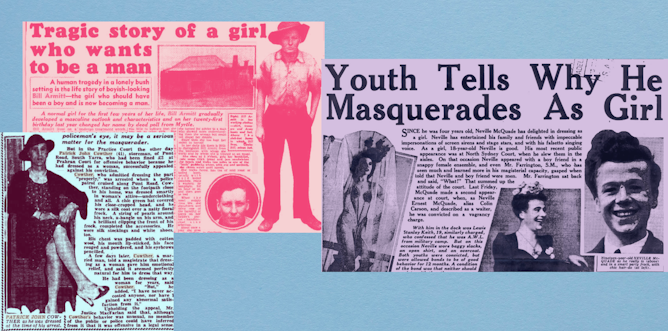|
In post-war Australia, writes historian Noah Riseman, there were no trans organisations or publicly advertised gender clinics. Trans people were frequently the subject of salacious media reports, but one change was that more stories presented their perspectives.
Patrick John Cowther, for instance, was arrested in Melbourne in 1944, “dressed in women’s clothes, a pearl necklace and a gold bangle and wearing lipstick, rouge, powder and eyeliner”. Cowther’s lawyer argued that Cowther dressed in women’s clothing as “an emotional relief … and to me it is perfectly natural”.
In our Friday essay, Riseman shows how trans people navigated an era during which they could be arrested for “offensive behaviour” and swept up in a medical system employing tests such as the degrading “penile volume response test”.
Still, writes Riseman, the rise of medical discourse about “transsexualism” and surgical options in Melbourne and Sydney “offered new explanations and opportunities, particularly for those trans people who adhered to stereotypical ideas of white, middle-class respectability. The postwar era also saw the consolidation of camp cultures in the capital cities, bringing together a variety of sexually diverse and gender-diverse people.”
|

|
Suzy Freeman-Greene
Books + Ideas Editor
|
|

Noah Riseman, Australian Catholic University
Before the 1970s, there were no trans organisations or publicly advertised gender clinics. But camp cultures brought together a variety of sexually- and gender-diverse people.
|

Michelle Grattan, University of Canberra
Looking a year ahead, Labor will be struggling against the electoral tide in Queensland, where (on present polling) the Palaszczuk government could lose office
|

Pep Canadell, CSIRO
Holding climate change to 1.5 might be possible – but in the best case, we’ll blow past the limit first and then backpedal.
|

Mark Patrick Taylor, Macquarie University; Hester Joyce, La Trobe University
The answer might surprise you.
|

Daryl Adair, University of Technology Sydney
It’s been over a decade since either club last won a premiership. Both teams have experienced plenty of lows since then.
|

Judith Ireland, The Conversation
The Conversation talks to University of Melbourne researcher Gwilym Croucher about what the Times Higher Education rankings mean.
|

William Bertsche, University of Manchester
It seems there isn’t a sci-fi part if the universe in which everything is made of antimatter.
|

Carl Rhodes, University of Technology Sydney
A new review found PwC Australia had a 'whatever it takes' culture, making those raking in the most money 'untouchables'. Australians need to know if that culture has infiltrated other big businesses.
|

Mary Lou Rasmussen, Australian National University; Celia Roberts, Australian National University; Louisa Allen, University of Auckland; Rebecca Williamson, Australian National University
If you were pregnant or parenting during Australia’s 2019–20 summer of smoke and fire, chances are you felt acutely anxious – and grappling with impossible responsibility.
|

Eric Howell, The University of Western Australia
Massive flashes of energy known as ‘fast radio bursts’ have puzzled astronomers for years – and a new search for links to gravitational waves has so far found no connection.
|
Arts + Culture
|
-
Russell Fewster, University of South Australia
Verity Laughton’s stage adaptation of Pip Williams’ best-selling book is a a very clever realisation.
|
|
Politics + Society
|
-
Adrian Beaumont, The University of Melbourne
The latest political opinion polls confirm the rightward trend since mid-year. But with NZ First on the rise, the shape of the next government remains unpredictable.
|
|
Health + Medicine
|
-
Nikki-Anne Wilson, UNSW Sydney
Extreme heat and bushfires bring unique challenges for someone with dementia. Here’s how we can all play a part in helping them stay safe and cool this spring and summer.
|
|
Science + Technology
|
-
Muhammad Rizwan Azhar, Edith Cowan University
Lithium-ion battery fires are rare, but they can cause a lot of damage – and they’re challenging to put out.
|
|
Environment + Energy
|
-
David Karoly, The University of Melbourne
Australia’s environment does not have sufficient legal protection from climate change, as outlined in a new report from the Climate Council Australia.
|
|
| |
|
|
|
NIDA
Kensington NSW, Australia
•
Full Time
|

|
|
|
|
| |
| |

|
| |
| |
| |
Featured Events, Courses & Podcasts
|
View all
|
|
1 January 2023 - 7 October 2026
•
|

|
6 July - 6 October 2023
•
|

|
11 October 2023
•
Caulfield East
|

|
19 - 20 October 2023
•
South Bank
|

|
|
|
|
| |
| |
| |
| |
| |
|
|